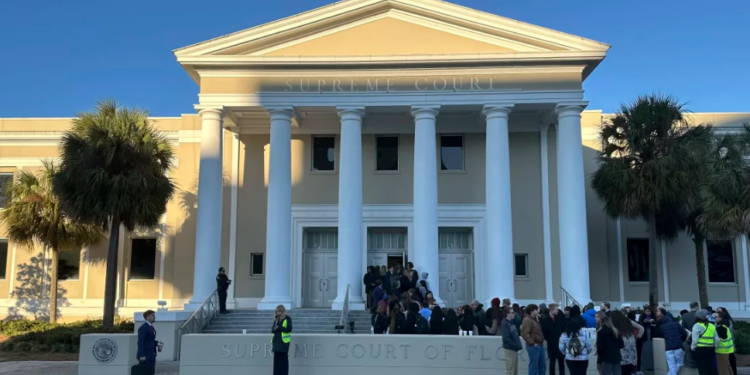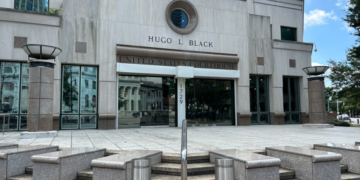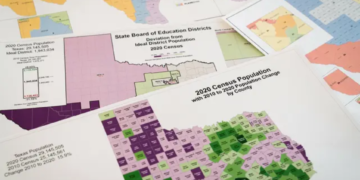Sep 12, 2024 Story by: Editor
TALLAHASSEE, Fla. — Florida’s high court is set to hear one of the latest legal battles concerning race and redistricting this Thursday.
Voting rights groups are appealing to the Florida Supreme Court to reinstate a congressional district that once gave Black voters in northern Florida the opportunity to elect their preferred candidate.
“We want to ensure that we are protecting Black congressional representation,” said Genesis Robinson, interim executive director of the Equal Ground Education Fund, one of the plaintiffs. “That’s why we’re challenging this unconstitutional map.”
Before the 2022 elections, Republican Governor Ron DeSantis successfully pushed to redraw the 5th Congressional District, which previously spanned 200 miles across North Florida, covering areas like Tallahassee and Jacksonville. The GOP-led legislature initially wanted to retain the district, but DeSantis took the unprecedented step of introducing his own map, which ultimately eliminated the district.
Former Democratic Representative Al Lawson, an African American, had held the old 5th district. The newly drawn area is now divided into four districts, with much of it becoming the 2nd district, represented by Republican Neal Dunn, a white congressman.
“There’s a high concentration of Black folks in that region,” Robinson said. “They haven’t had the chance to elect their candidate of choice since the new map was enacted.”
The Florida Supreme Court will hear arguments from both sides and decide whether to uphold the current map or mandate a new one that restores Black voter representation in the area. This case has reached the state’s highest court after plaintiffs found no resolution in federal courts.
In December, a three-judge panel from the U.S. District Court in the Northern District of Florida upheld the current map, ruling that the plaintiffs couldn’t prove the legislature acted with discriminatory intent. Plaintiffs have indicated they do not plan to appeal the federal court’s decision.
State Constitution at the Center of the Case
At the heart of the case is the 2010 Fair Districts Amendments added to Florida’s constitution, which prohibits racial and partisan gerrymandering. Plaintiffs argue that the current map violates this provision by diminishing the ability of minority voters to elect their candidate of choice.
“We simply want the state to follow the law,” Robinson stressed.
In 2012, the Florida Supreme Court established that a district allowing minority groups to elect their preferred candidate couldn’t be removed without replacing it with another district offering the same opportunity. This interpretation led to the approval of the former 5th Congressional District.
“The concern now is that the Florida Supreme Court could reverse this precedent,” said Marina Jenkins, executive director of the National Redistricting Foundation, a nonprofit affiliated with the Democratic Party, which is supporting the lawsuit.
Since the previous ruling, the makeup of the Florida Supreme Court has shifted, with most justices now appointed by DeSantis. Jenkins emphasized, “It shouldn’t be the case that court personnel determine outcomes, but rather the precedents they apply.” She added, “We believe we have a strong case — this is a textbook application of the law.”
Legal Journey Continues
However, a state appellate court recently saw things differently.
In December, Florida’s First District Court of Appeal upheld the governor’s map, overturning a lower court’s ruling and breaking from previous state Supreme Court precedent. The appellate court argued that the Fair Districts Amendments only apply when specific federal redistricting criteria are met. It ruled that Black voters spread across different regions weren’t protected by the amendments because the old 5th district wasn’t “geographically compact.”
State attorneys echoed the appellate court’s stance, stating that the former map violates the U.S. Constitution’s Equal Protection Clause by prioritizing race over other criteria, such as geographic compactness.
Many Democrats and other critics see the appellate court’s decision as a significant departure from established judicial norms. Jenkins described it as “wildly out of step,” while Michael Li, a redistricting expert at New York University’s Brennan Center for Justice, called it an “open and shut case” based on past Florida rulings.
“If the Florida Supreme Court sides with the appellate court, it could significantly weaken protections for voters of color,” Li warned.
If the plaintiffs succeed, a new map wouldn’t take effect until at least 2026, three election cycles after the DeSantis-backed map came into play. If they lose, the case could be taken to the U.S. Supreme Court.
But voting rights advocates are eager for a resolution.
“It’s crucial to have representation that reflects the community,” Robinson said. “We’re hoping the Florida Supreme Court will rule in our favor and restore that representation for these voters.” Source: NPR

















